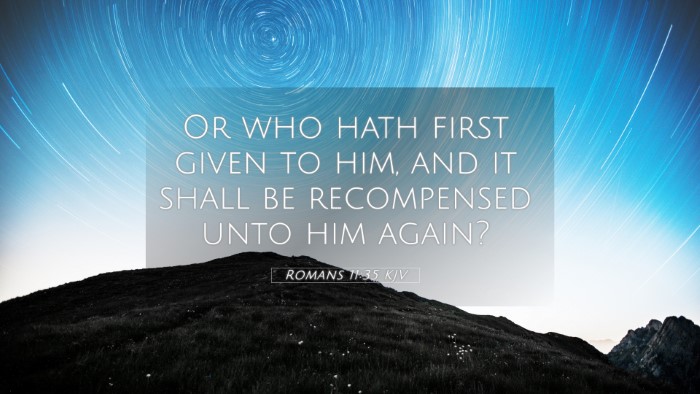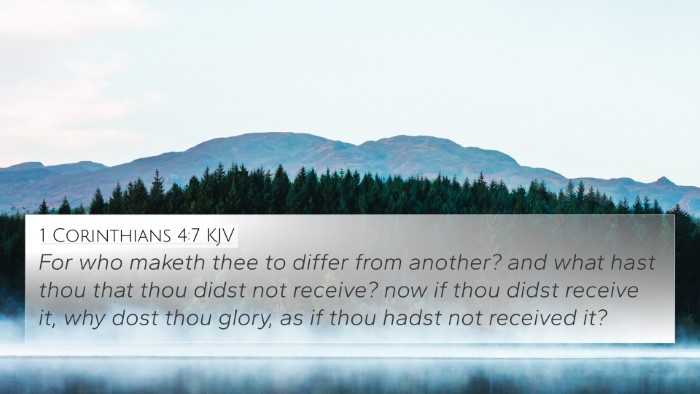Understanding Romans 11:35
Romans 11:35 states, "Or who hath first given to him, and it shall be recompensed unto him again?" This verse highlights God's sovereignty and grace in the relationship between God and humanity.
Meaning and Interpretation
This verse raises profound theological questions, focusing on the nature of God's relationship with man. It emphasizes the idea that God does not owe anything to humanity; rather, it is through His grace that we receive blessings.
Insights from Commentaries
-
Matthew Henry:
Henry notes that this verse serves as a rhetorical question, implying that no one can outgive God. It stresses the fact that all good things come from Him, and human efforts do not place God in debt.
-
Albert Barnes:
Barnes elaborates that the verse suggests that everything originates from God, and any good we offer is merely a response to what He has already provided us. Hence, the notion of 'giving' holds a different significance in the divine context.
-
Adam Clarke:
Clarke reinforces the idea of grace, articulating that even our faith and works are gifts from God. Hence, no one can claim to have contributed anything that puts God under obligation.
Bible Verse Cross-references
This verse is closely related to several other scriptures that reflect similar themes of God’s grace and human dependency on Him:
- Job 41:11 - "Who has a claim against me that I must pay? Everything under heaven belongs to me."
- Luke 17:10 - "So you also, when you have done everything you were told to do, should say, 'We are unworthy servants; we have only done our duty.'"
- Ephesians 2:8-9 - "For by grace you have been saved through faith, and that not of yourselves; it is the gift of God, not of works, lest anyone should boast."
- 1 Corinthians 4:7 - "For who makes you differ from another? And what do you have that you did not receive? Now if you did indeed receive it, why do you boast as if you had not received it?"
- Romans 3:24 - "Being justified freely by His grace through the redemption that is in Christ Jesus."
- Philippians 1:29 - "For to you it has been granted on behalf of Christ, not only to believe in Him but also to suffer for His sake."
- James 1:17 - "Every good gift and every perfect gift is from above, and comes down from the Father of lights."
Thematic Connections in the Bible
The central theme of Romans 11:35 resonates throughout Scripture, emphasizing God’s gracious character and our need for dependence on Him:
- Grace: Exploring how grace is the foundation of all interactions between God and humanity.
- Dependency: Understanding our position as receivers of God’s unmerited favor.
- Sovereignty: Affirming God's ultimate control over all creation and how nothing can be demanded from Him.
Links Between Old and New Testament
Romans 11:35 serves as a bridge connecting various biblical themes found in both the Old and New Testaments. Not only does it reflect God’s character as seen in Job, but it also reinforces New Testament teachings on grace, as found in Ephesians and Philippians.
Conclusion
In analyzing Romans 11:35 alongside cross-referenced scriptures, we gain a deeper understanding of God's grace and sovereignty. The interconnectedness of Scripture reveals a magnificent tapestry of theological truths that guide believers in their faith journey.
Tools for Bible Cross-Referencing
For those studying the Scriptures, utilizing tools for Bible cross-referencing can enhance understanding:
- Bible concordances to locate key themes and related verses.
- Bible cross-reference guides for comparative study.
- Using a systematic approach for studying links between verses.
- Finding resources and materials that provide cross-reference insights.
By engaging with Romans 11:35 and its cross-references, believers can further appreciate the profound nature of their relationship with God, rooted deeply in grace and reverence.






